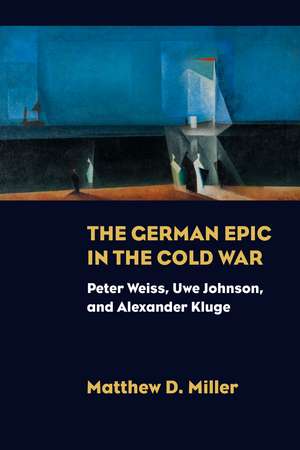The German Epic in the Cold War: Peter Weiss, Uwe Johnson, and Alexander Kluge
Autor Matthew D. Milleren Limba Engleză Hardback – 14 iul 2018
Matthew Miller’s The German Epic in the Cold War explores the literary evolution of the modern epic in postwar German literature. Examining works by Peter Weiss, Uwe Johnson, and Alexander Kluge, it illustrates imaginative artistic responses in German fiction to the physical and ideological division of post–World War II Germany.
Miller analyzes three ambitious German-language epics from the second half of the twentieth century: Weiss’s Die Ästhetik des Widerstands (The Aesthetics of Resistance), Johnson’s Jahrestage (Anniversaries), and Kluge’s Chronik der Gefühle (Chronicle of Feelings). In them, he traces the epic’s unlikely reemergence after the catastrophes of World War II and the Shoah and its continuity across the historical watershed of 1989–91, defined by German unification and the dissolution of the Soviet Union.
Building on Franco Moretti’s codification of the literary form of the modern epic, Miller demonstrates the epic’s ability to understand the past; to come to terms with ethical, social, and political challenges in the second half of the twentieth century in German-speaking Europe and beyond; and to debate and envision possible futures.
Miller analyzes three ambitious German-language epics from the second half of the twentieth century: Weiss’s Die Ästhetik des Widerstands (The Aesthetics of Resistance), Johnson’s Jahrestage (Anniversaries), and Kluge’s Chronik der Gefühle (Chronicle of Feelings). In them, he traces the epic’s unlikely reemergence after the catastrophes of World War II and the Shoah and its continuity across the historical watershed of 1989–91, defined by German unification and the dissolution of the Soviet Union.
Building on Franco Moretti’s codification of the literary form of the modern epic, Miller demonstrates the epic’s ability to understand the past; to come to terms with ethical, social, and political challenges in the second half of the twentieth century in German-speaking Europe and beyond; and to debate and envision possible futures.
Preț: 696.89 lei
Preț vechi: 849.86 lei
-18% Nou
Puncte Express: 1045
Preț estimativ în valută:
133.36€ • 140.23$ • 110.19£
133.36€ • 140.23$ • 110.19£
Carte indisponibilă temporar
Doresc să fiu notificat când acest titlu va fi disponibil:
Se trimite...
Preluare comenzi: 021 569.72.76
Specificații
ISBN-13: 9780810137332
ISBN-10: 081013733X
Pagini: 272
Ilustrații: 10 b-w images
Dimensiuni: 152 x 229 x 23 mm
Greutate: 0.5 kg
Editura: Northwestern University Press
Colecția Northwestern University Press
ISBN-10: 081013733X
Pagini: 272
Ilustrații: 10 b-w images
Dimensiuni: 152 x 229 x 23 mm
Greutate: 0.5 kg
Editura: Northwestern University Press
Colecția Northwestern University Press
Notă biografică
MATTHEW D. MILLER is an associate professor of German at Colgate University.
Cuprins
Contents
List of Figures
Abbreviations
Introduction: A Genre for Cold Times
Chapter 1. Modern Epic Possibilities: Tasks and Techniques of a Genre
Chapter 2. Epic’s Impossible Return: Peter Weiss’ Die Ästhetik des Widerstands
Chapter 3. Time-Spaces of Epic Narration: Uwe Johnson’s Jahrestage
Chapter 4. Epic Storytelling and Human Survival: Alexander Kluge’s Chronik der Gefühle
Epilogue: Epic for the Twenty-first Century
Acknowledgments
Notes
Index
List of Figures
Abbreviations
Introduction: A Genre for Cold Times
Chapter 1. Modern Epic Possibilities: Tasks and Techniques of a Genre
Chapter 2. Epic’s Impossible Return: Peter Weiss’ Die Ästhetik des Widerstands
Chapter 3. Time-Spaces of Epic Narration: Uwe Johnson’s Jahrestage
Chapter 4. Epic Storytelling and Human Survival: Alexander Kluge’s Chronik der Gefühle
Epilogue: Epic for the Twenty-first Century
Acknowledgments
Notes
Index
Descriere
In The German Epic in the Cold War, Matthew D. Miller explores the revival of the literary epic in postwar German literature in response to World War II, the upheavals of the 1960s, German unification, and the collapse of the Soviet Union.
